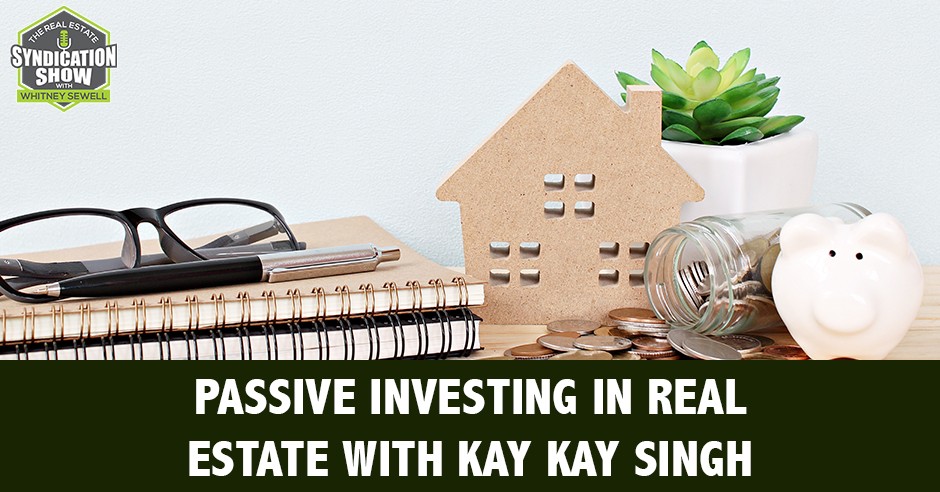Listen to the podcast here:
There are several niches in real estate you can focus on. Kay Kay Singh found that where his passion lies is passive investing through syndication. Kay Kay Singh is the CEO of Grow Rich Capital. He has over eighteen years of business experience in the US with multifamily syndicated deals in several locations. He also has several agricultural, commercial and residential properties in India. He walks us through the different parts of a deal, the opportunities, who to partner with, and what we should be looking for in an investment.
Our Gracious Sponsor:
Are you tired of answering emails from investors about when they’ll receive their K-1s?
Let The Real Estate CPA handle the accounting and taxes on your next syndication and they’ll file your tax returns by March 15th so you can get K-1s to your investors by the individual filing deadline on April 15th.
Not only will this reduce headaches, but it will help you retain investors over the long-term by improving investor experience.
The Real Estate CPA is now offering a Special Virtual Workshop to the listeners of The Real Estate Syndication Show on How to Answer Tax Related Questions from Your Investors!
Learn more today by visiting: http://bit.ly/Real_Estate_CPA
—
Watch the episode here:
Listen to the podcast here:
Passive Investing In Real Estate with Kay Kay Singh
Our guest is Kay Kay Singh. I’m happy to have him back. Thanks for being on the show again, Kay Kay.
Thank you. It’s my pleasure, Whitney.
Kay Kay was on a previous show, WS114. I would encourage you to go back and read that to learn more about his story and how he got into real estate. He has over eighteen plus years of business experience in the US. He is always seeking expansion opportunities and he’s always interested in new investment opportunities. He has multifamily syndicated deals in several locations in the US and has several agricultural, commercial and residential properties in India as well. Kay Kay is a very knowledgeable person about this industry. He’s learned very fast and he’s crushing it. I want you all to know who he is and we’re going to learn a lot from him. Kay Kay, they can always go back to 114 and learn your entire story, but give them a little more about you and let’s dive in.
Thank you very much, Whitney. My name is Kay Kay and I live in Fort Wayne, Indiana. I’ve been here for almost twenty years and have been in the gas station business. In 2014, we bought 40 single-family houses and bought into the real estate business. Soon after that, I realized that a single-family is not what I wanted to do. I moved on to the multifamily, and I started learning about multifamily. I actually started trying to buy our multifamily ourselves. We started with 32 units and gave LOIs and then slowly we bought note. We need to go bigger and we decided to buy 96 units. All the time, our offers were rejected because we realized that we don’t know the business. It’s not like buying single-family. It is a whole new animal and it’s a different thing that we need to learn. I started learning and also, I started investing as a limited partner. When I invested the first time as an LP, I didn’t know much about it. I just wanted to learn and I gave the syndicator a $50,000 check and started learning from there.
You wanted to get into multifamily. You quickly realize how long it was going to take with single-family to scale, so you started pursuing multifamily, started submitting those LOIs. All of them get rejected. Quickly you realized it’s a whole new animal than what you had been doing. Let’s walk through that approach a little bit because I’ve had numerous people invest with me and they’re looking to be a syndicator, they’re looking to get into deals and eventually be a deal sponsor like yourself. They’ve invested just to learn the industry and learn the business better like you did. Let’s help the audience or maybe the potential investor who wants to be a syndicator or a deal sponsor. Go through those thought processes that you were having as far as should I be a passive investor so I can learn the business or should I keep putting in my LOIs. Take us back to when you were there and how you decided to be a passive and learn to do this business.
When I was in the gas station business and I have a lot of cashflow because I have eight gas stations and a laundromat, my main purpose was how can I reduce my taxes? We bought these 40 single-family houses and ended up paying even more taxes. I signed up on BiggerPockets, and started learning about multifamily and the syndication process. That’s when I learned about what syndication is. I started following syndicators on BiggerPockets and went to their website, kept learning, read some books about syndication. Finally, I decided to take some courses. When I started, I was not invested in becoming a syndicator, but I thought, “I’m going to keep investing passively.” As I started learning, I realized that it was my passion.
I decided to go active instead of passive. I took four courses that had a lot of syndication books, and I read a lot of other books. Also, I got into some motivational stuff since I attended the Rod Khleif’s camp. It was so motivational. I started learning about motivations. I had been setting up my goals, but most of my goals I can’t meet because I was not doing the right way. I started learning about setting goals, how to set goals and how to track my goal and how to be very specific on the goal. I started learning all that motivational stuff and kept moving on onwards and upwards, which is the motto of our company. I kept learning and kept doing some stuff every day. Finally, I invested in seven deals passively. In two deals, I’m a general partner. I kept moving on upwards and onwards and that’s how I got here.
You’re very experienced as a passive investor. You’ve invested on seven deals. Let’s help the passive investor from your experience to know who to partner with and what we should be looking for. Maybe help them get started off a few things that they should do to help narrow down the deals, the opportunities to quickly say, “Here are some sponsors that I want to start hearing their opportunities.” How do we know who those people should be?
I started following them on BiggerPockets. I have been writing, taking notes and making links in my Evernote. I’m very passionate about Evernote. I use Evernote a lot. I made a list of sponsors who I found on the internet. First, I started with BiggerPockets. I made a whole list and then I started following them on BiggerPockets. From there, I went to their website, did some research, did their track record, how many deals they have done. I started calling them and interviewing them. I made a list of all these 42 questions to ask them. As I kept learning, the list started to grow bigger. I wrote down my criteria of investment but that was passively. How do I pick up my sponsor? How do I pick up the deals? Finally, I picked up one sponsor to start with. The closest one was in Indianapolis, which was Ivan Barratt. I invested in the deal and kept learning. I got access to the reports. Every three months, they send the reports. I go to the portal and I can download the report and read those reports. What’s going on the property? Also, I could see the money flowing in. That’s how I figured it out. I did the research on several other sponsors too and I’m invested with four or five different sponsors.
Could you help us with those criteria? Somebody that is just getting started, they don’t understand how to come up with the criteria they should have. Kay Kay, help them build their criteria for that deal sponsor or the criteria like you had.

First of all in my criteria, number one is the strong growth market. I want to see at the population of the market. I want to see the job growth of the market. When I receive these offering memorandums, I signed up with several indicators. I talk to several of them. I got on their email list and started receiving the OM. I go online since I had taken all these classes in the coaching program from Rod Khleif, Neal Bawa, and some others. I know how to discuss the market. I did my own research. From the job market, I looked at the underwriting if it’s conservative underwriting or it’s liberal underwriting. I do my own research and then I look at my minimum IRR. I want my money to double in five to six years. I always invest with the investors that have skin in the game. That’s one of my criteria. I want to look at the cash-on-cash return and the IRR and I like to address within five to seven years. These criteria may differ from person-to-person depending on their goals and their financial ability to invest. This is what my criteria is. I wrote it down. I am also going to be at some point in investing in other asset classes, like the mobile parks and the solo unit, but I’m focusing on the multifamily.
We’ve talked at numerous events and stuff and it’s been great to get to know you and your growth in this business as well and see that happen. One key thing about you is that you have educated yourself. You have spent the time and the money. You’ve met the people in the business. Even if you never became a general partner or a deal sponsor, you’re much more educated, you are much savvier about investing in these types of opportunities because of the work you’ve done beforehand. Even talking about a strong growth market and knowing where to find that information and what that should look like, especially to the underwriting and numerous other things you mentioned, most investors are busy with their other business or their day job, whatever that may be. They don’t want to take the time to educate themselves like you have. Maybe for the audience, let’s break a few of those down as far as the strong growth market, job growth. What’s going to help you see that this is a good market as far as job growth and population growth? Do you have a couple of specific things on the amount of growth or maybe where you have found that information?
Whitney, if there is no job growth or if there is no population growth, you cannot expect your occupancy to be higher. You cannot expect the rank to go up. It’s a demand and supply thing. If the population is going down, definitely the vacancy is going to be higher. If people don’t have money, if the people are losing jobs as they did in 2007, 2008, what they do normally is they consolidate themselves. If the son is living separate, they’ll move with their parents so that they can make both ends meet. I think these are the basic points population and the job growth are the two keys that everybody should be looking at as they invest as a limited partner or a general partner or even if they buy a property for themselves.
You can even do a Google search. You can search the city and put population growth or population and you’re probably going to immediately find some quick information too so you know if that’s a place initially maybe you should be looking at or not at a high level. What about underwriting, Kay Kay? Not many passive investors understand underwriting to a deep degree. They struggle with underwriting. How did you come to a good understanding of knowing what you’re looking at when syndicators send you the underwriting? How did you learn that? Maybe give us some basic things so we know what to look for as a passive investor getting started.
First of all, I collected several of the underwriting tools, calculators from different sources. I’ve got about ten of them. I tried to see which one is simpler to use and chose the maximum data. I’m a number person. Even in the gas station business, laundromat business, I always look at the numbers. When I’m looking at the writing, I can see certain things which I always see in the writings of the syndicators when I received their OMs. I can see whether it’s conservative or not and whether they have done the sensitivity analysis or not. A lot of people don’t do the sensitivity analysis and they’ll say, “The market growth is 3%.” They put it for five years or seven years that the market will go up every year. I do the property management for my 40 single-family houses myself. I know this is not a fact that they can always go 3% up. If the house or the apartment is renting $700, maybe the next tenant is renting at $700 again. Also, a slight change in the cap rate can change the whole thing. It could make a bad deal into a good deal.
[bctt tweet=”Set specific goals and track your goal to see your progress.” username=””]
We talked about the sponsors a little bit. A good sponsor can make a bad deal into a good deal. A bad sponsor can make a good deal into a bad deal, especially new syndicators who are trying to syndicate deals with other people’s money, especially if they come from those deal courses. They want to do syndication because they’re told to do it at 90 days or 180 days and they tried to find a deal, which is a lot expensive. They don’t know how to underwrite it and then they’ll make the numbers look good. They don’t understand that when the investors invest with them for one if they don’t perform on the performer, they’re going to lose all those investors and never get them back again. Don’t do the deals. I would suggest to your audience, don’t do the deals just to do a syndication, just to do a deal or just look at your benefit of doing the deal. You’re going to get acquisition and asset management fee, but make sure to keep your investor’s money as your own money, even more, because it’s other people’s money.
On the underwriting, specifically though when you’re investing passively, is there something that’s going to help you without a great understanding of underwriting as a new passive investor? What couple of things are going to help me to see that they’re being conservative on a basic level?
One thing we talked about is the rank and sometimes that is another indicator. What kind do you have? Even if they have a big loan and the interest rate is not capped on the big loan, it could end up in a disaster.
The way it’s financed is crucial.
Financing is crucial to look at in the return. Preferred return, that’s very important. What is the breakeven point of the occupancy? Let’s say there’s a dip in the real estate and occupancy goes down. If they go underwater, they’re not going to survive too long. If they had done the sensitivity analysis, there is interest rates change, there is a vacancy change and there are variables in every underwriting. Do the sensitivity analysis. Sometimes people call it stress test. Do that before you buy the property.

I would say ask the deal sponsor for the sensitivity analysis and have them walk through that a little bit with you.
That’s one of my questions. These questions, I had put them on Facebook. I always ask them if they had done the sensitivity analysis and ask them what the breakeven point is. If the breakeven point is 85%, it’s definitely going down. Also, what percentage leverage is. If it’s highly leveraged, it could go underwater anytime.
You mentioned return. If I’m a new or passive investor, what type of return should I try to look to see on a deal? If I know it’s conservative, what’s maybe the minimum returns I should expect?
I like to have some kind of preferred return. It’s a variable. It depends on what kind of property is it. If it’s a deep value-added property, you may not get it. I always want to get a preferred return and I always like to give a preferred return as a general partner too because that makes the sponsor work harder. The second thing is I like about 8% to 10% cash-on-cash. I want to double my money into five to six years. I’m not worried about getting 25%, 30% or 40% of my money in the 30 years because it depends on other people’s needs too and their financial goals. I don’t look at that like, “I need to get my money, 25% or 50% of my money in the 30 years. If they already loaned, they’re going to refinance the property again.” I’m not worried about it that much. I try to look at about 18% IRR too.
18% IRR, that’s great. Preferred return is great. Most sponsors are offering preferred returns. I think it’s pretty standard. Maybe not always, but as a new passive, I would want a preferred return as well. As a passive investor, you’ve invested in seven deals. I know you want the best deals. You want the most conservative underwriting. You want somebody with that track record. We’ve talked about that numerous times on the show. How do you find that deal sponsor that has that track record and what to look for there? What about the newer syndicator that only had one or two syndications? Is that somebody you’re willing to partner with?
[bctt tweet=”Invest in yourself before you invest in any real state. Try to learn the business and educate yourself.” username=””]
I get calls all the time to raise money for them or sign their loans as a KP because I have a network. They meet me on online meetings or Facebook or on the networking that I go to and they always expect me to. I’m not saying nobody should start new. My criteria is partnering with some track record person so that you have a good reputation when you are aligned with somebody who has a track record. If somebody is just starting and he wants me to invest in his deal, I may not sign his loan. Even if he gives me whatever share of the DP pie, I would not risk my network for somebody new. I think the best thing is to partner with some experienced people and bring something to the table. Either the capital or a little bit of experience you have in finance field or management field, whatever you can bring to the table. There are a lot of sponsors who are looking for partners. Syndication is teamwork. You can find partners, network with partners and see what you can bring. Let’s say I’m a good underwriter but I’m not a field person, I need to partner with somebody who’s passionate about the fieldwork like doing due diligence and doing the property management or the asset management or whatever you can bring to the table.
Any final words for that passive investor that’s looking to invest in deals? Maybe they’re just learning the syndication business. They’re brand new to this type of asset or this type of investing. What would you tell them? Any final things that I didn’t ask you that you’d like to share with them?
I always suggest to your audience that invest in yourself before you invest in any real state. Try to learn the business. Try to educate yourself. There’s a lot of material out there that’s free. Also, join some Facebook groups. There are a lot of people throwing a lot of information there. You can learn from them. Buy some books, read some books, podcasts, all free stuff where you can learn. I listen to one podcast every day and I have been listening to it for about three years.
You’ve covered a lot of podcasts.
Whenever I’m at the gym, I’d listen to at least one. Sometimes I listen to two and I listen to yours.

Thank you again, Kay Kay, for your time and sharing your expertise. I appreciate becoming friends with you and getting to know you at different events and us communicating. The way you’ve invested in numerous deals, now you’re on the GP side of few deals and you’re making it happen. I know a lot of people would like to follow in your footsteps and make their business happen as you have. Tell the audience how they can learn more about you and get in touch with you.
They can go to our website, GrowRichCapital.com and sign up for our newsletter. I’ve got my phone number. My cell phone number is 260-341-1964. They can email me at [email protected]. They can join our Facebook group, which is 10X Multifamily Investing Group. There are a lot of activities, a lot of incredible people over there. They’re ready to educate you and give you all kinds of information. There’s a lot of information. In one month, we have over 800 members. Also, we have more than 5.5 thousand posts and impressions on that page.
You are crushing it. Thanks for sharing that. I hope the audience will connect with you. Not everybody puts their phone number out and their email like that. I appreciate that.
I receive calls all the time, Whitney. I think we forgot one thing to talk about and that is how do I give back?
We weren’t asking that. I thought we probably talked about that before, but we haven’t, so how do you give back Kay Kay?
We have our own charity, that’s SDBCharity.org. We donate about $25,000 every year to six different organizations all over the world. We have adopted fifteen kids for the last several years that we pay them for their shelter, education and food.
You built this nonprofit. Did you do all this yourself?
I did everything myself. No public donations accepted. It’s just our money. I thank my partners for making that charity a success.
Thank you so much for sharing that, Kay Kay, and what you’re doing there. I remember us talking about it. It’s impressive. You find something like that that you want to pursue and you dig in and you learn everything about it as you can. You’re doing the same thing in the syndication business, but I appreciate how you give back and you’re sharing that with us. Many people have been affected by your generosity through that and we appreciate that. I hope the audience will also go to Life Bridge Capital and connect with me. Go to the Facebook group, The Real Estate Syndication Show. We hope to see you there and we hope to talk to you again next time.
Important Links:
- Kay Kay Singh
- WS114 – Past episode
- BiggerPockets
- Rod Khleif
- Evernote
- GrowRichCapital.com
- [email protected]
- 10X Multifamily Investing Group – Facebook group
- SDBCharity.org
- The Real Estate Syndication Show – Facebook Group
About Kay Kay Singh

Have several agricultural and commercial and residential properties in India. Has over 18+ years of business experience in US and always seeking expansion opportunities. Always interested in new investment opportunities.
Love the show? Subscribe, rate, review, and share!
Join the Real Estate Syndication Show Community:



